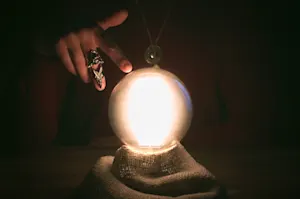What Makes This Word Tick
"Evanescent" has a poetic ring to it, doesn't it? Like a whisper on the wind, it suggests something that is short-lived, fragile, and fleeting. Often used to evoke imagery of fading light or dissipating mist, this word captures the beauty of transient moments that vanish almost as quickly as they appear.
If Evanescent Were a Person…
If evanescent were alive, it would be the mysterious stranger at a party, who appears just long enough to intrigue everyone with anecdotes of far-off lands before disappearing into the night. With a knack for leaving a lasting impression, this person would be the perfect mix of allure and enigma—just when you think you've caught a glimpse of them, they've slipped away.
How This Word Has Changed Over Time
Originally drawn from the Latin "evanescere," which means "to vanish," the word "evanescent" has held onto its ephemeral roots. Over the centuries, it has danced through Romantic poetry and nature writing, maintaining its association with things that are beautiful and temporary. While the essence of the word remains unchanged, its usage has widened, now capturing fleeting emotional states or even tech phenomena like disappearing digital messages.
Old Sayings and Proverbs That Use Evanescent
While “evanescent” itself is not embedded in old proverbs, its essence lives in sayings like "All things must pass" or the wistful "This too shall fade." These phrases remind us that life is studded with moments of beauty and pain that are as temporary as morning dew.
Surprising Facts About Evanescent
Did you know that in physics, "evanescent waves" refer to certain electromagnetic waves that decay exponentially with distance? These waves align perfectly with the word's transient nature and add an intriguing scientific dimension to its profile. It's a rare example of language seamlessly blending with scientific nomenclature.
Out and About With This Word
You'll find "evanescent" fluttering through descriptions of nature, appearing in travel brochures for sunset boat rides and flowery photo captions on social media. It's a go-to word for anyone trying to capture the essence of a fleeting moment that leaves a lasting memory.
Pop Culture Moments Where Evanescent Was Used
In pop culture, "evanescent" brings to mind songs and works of art that encapsulate brief but memorable experiences or emotions. The band Evanescence, which borrows the word, has captured these transient emotions in their music, helping raise awareness—even if indirectly—about its delicate meaning.
The Word in Literature
"Evanescent" is a literary darling, adored by poets and novelists alike. It peppers the pages of Romantic literature and contemporary works that aim to highlight life's transitory beauty. Think of authors like Virginia Woolf or Henry James, who might employ such a term to describe a character's fleeting thoughts or a quickly fading sunset.
Moments in History with Evanescent
Consider the signing of peace treaties or landmark speeches—moments that, though over quickly, have effects echoing through time like evanescent footprints on the sands of history. The word "evanescent" would splendidly describe both such moments and their immediate impact felt before the longer outcome unfolds.
This Word Around the World
Across cultures, the concept of the evanescent is expressed in various fascinating ways. The Japanese often reflect upon mono no aware, an awareness of the transience of things, much like "evanescent" embodies. Globally, many cultures recognize and celebrate the brief beauty found in life's fleeting moments.
Where Does It Come From?
Stemming from the Latin "evanescere," "evanescent" traveled through Old French before finally landing in the English lexicon. Its journey through languages reflects the word's very nature: passing through time and space, leaving an impact, and gently fading into the fabric of everyday speech.
How People Misuse This Word
People occasionally confuse "evanescent" with terms like 'ethereal' or 'ethnic', perhaps mistaking its delicate essence for something otherworldly or culturally specific. Ensure its use is reserved for what is vivid and beautiful, but ultimately, briefly sustained.
Words It’s Often Confused With
Ethereal: Both words suggest something delicate, but "ethereal" often implies a heavenly or unearthly quality.
Transient: Focuses more on temporary duration, whereas "evanescent" includes a sense of fading away.
Fleeting: Similar, but "fleeting" doesn't capture the graceful or delicate quality intrinsic to "evanescent."
Additional Synonyms and Antonyms
If you're in the mood for synonyms, try "ephemeral," "brief," or "momentary." For an antonym, consider "enduring" or "permanent," words that plant themselves firmly, resisting the delicate drift of an "evanescent" existence.
Want to Try It Out in a Sentence?
“Watching the evanescent glow of the sunset, she realized that some of the most beautiful things in life are the ones that don't last.”
















